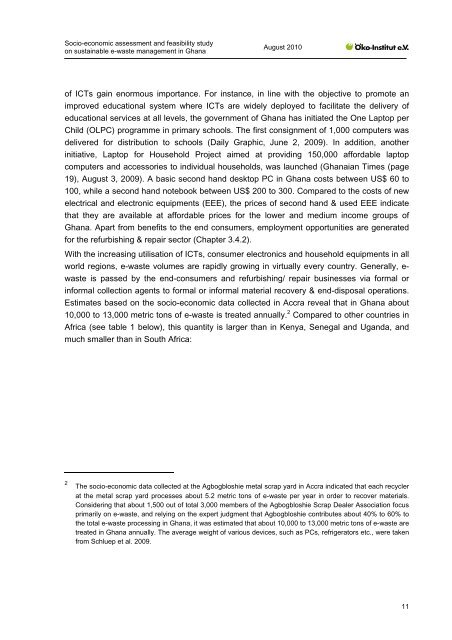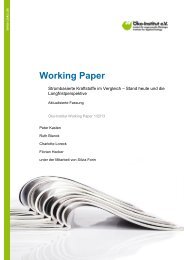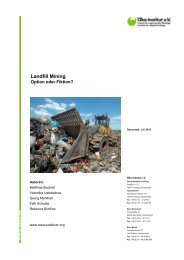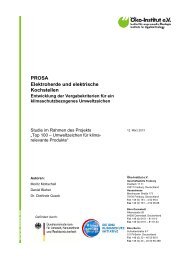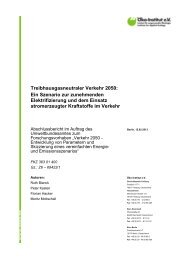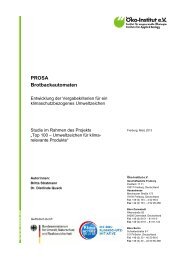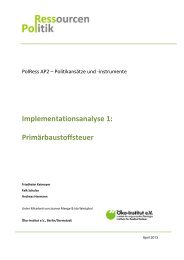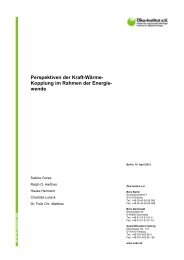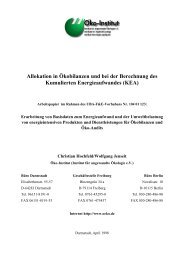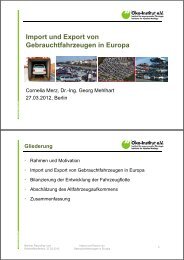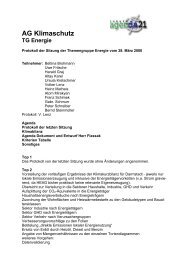Socio-economic assessment and feasibility study on - Öko-Institut eV
Socio-economic assessment and feasibility study on - Öko-Institut eV
Socio-economic assessment and feasibility study on - Öko-Institut eV
You also want an ePaper? Increase the reach of your titles
YUMPU automatically turns print PDFs into web optimized ePapers that Google loves.
<str<strong>on</strong>g>Socio</str<strong>on</strong>g>-<str<strong>on</strong>g>ec<strong>on</strong>omic</str<strong>on</strong>g> <str<strong>on</strong>g>assessment</str<strong>on</strong>g> <str<strong>on</strong>g>and</str<strong>on</strong>g> <str<strong>on</strong>g>feasibility</str<strong>on</strong>g> <str<strong>on</strong>g>study</str<strong>on</strong>g><br />
<strong>on</strong> sustainable e-waste management in Ghana<br />
August 2010<br />
of ICTs gain enormous importance. For instance, in line with the objective to promote an<br />
improved educati<strong>on</strong>al system where ICTs are widely deployed to facilitate the delivery of<br />
educati<strong>on</strong>al services at all levels, the government of Ghana has initiated the One Laptop per<br />
Child (OLPC) programme in primary schools. The first c<strong>on</strong>signment of 1,000 computers was<br />
delivered for distributi<strong>on</strong> to schools (Daily Graphic, June 2, 2009). In additi<strong>on</strong>, another<br />
initiative, Laptop for Household Project aimed at providing 150,000 affordable laptop<br />
computers <str<strong>on</strong>g>and</str<strong>on</strong>g> accessories to individual households, was launched (Ghanaian Times (page<br />
19), August 3, 2009). A basic sec<strong>on</strong>d h<str<strong>on</strong>g>and</str<strong>on</strong>g> desktop PC in Ghana costs between US$ 60 to<br />
100, while a sec<strong>on</strong>d h<str<strong>on</strong>g>and</str<strong>on</strong>g> notebook between US$ 200 to 300. Compared to the costs of new<br />
electrical <str<strong>on</strong>g>and</str<strong>on</strong>g> electr<strong>on</strong>ic equipments (EEE), the prices of sec<strong>on</strong>d h<str<strong>on</strong>g>and</str<strong>on</strong>g> & used EEE indicate<br />
that they are available at affordable prices for the lower <str<strong>on</strong>g>and</str<strong>on</strong>g> medium income groups of<br />
Ghana. Apart from benefits to the end c<strong>on</strong>sumers, employment opportunities are generated<br />
for the refurbishing & repair sector (Chapter 3.4.2).<br />
With the increasing utilisati<strong>on</strong> of ICTs, c<strong>on</strong>sumer electr<strong>on</strong>ics <str<strong>on</strong>g>and</str<strong>on</strong>g> household equipments in all<br />
world regi<strong>on</strong>s, e-waste volumes are rapidly growing in virtually every country. Generally, ewaste<br />
is passed by the end-c<strong>on</strong>sumers <str<strong>on</strong>g>and</str<strong>on</strong>g> refurbishing/ repair businesses via formal or<br />
informal collecti<strong>on</strong> agents to formal or informal material recovery & end-disposal operati<strong>on</strong>s.<br />
Estimates based <strong>on</strong> the socio-<str<strong>on</strong>g>ec<strong>on</strong>omic</str<strong>on</strong>g> data collected in Accra reveal that in Ghana about<br />
10,000 to 13,000 metric t<strong>on</strong>s of e-waste is treated annually. 2 Compared to other countries in<br />
Africa (see table 1 below), this quantity is larger than in Kenya, Senegal <str<strong>on</strong>g>and</str<strong>on</strong>g> Ug<str<strong>on</strong>g>and</str<strong>on</strong>g>a, <str<strong>on</strong>g>and</str<strong>on</strong>g><br />
much smaller than in South Africa:<br />
2 The socio-<str<strong>on</strong>g>ec<strong>on</strong>omic</str<strong>on</strong>g> data collected at the Agbogbloshie metal scrap yard in Accra indicated that each recycler<br />
at the metal scrap yard processes about 5.2 metric t<strong>on</strong>s of e-waste per year in order to recover materials.<br />
C<strong>on</strong>sidering that about 1,500 out of total 3,000 members of the Agbogbloshie Scrap Dealer Associati<strong>on</strong> focus<br />
primarily <strong>on</strong> e-waste, <str<strong>on</strong>g>and</str<strong>on</strong>g> relying <strong>on</strong> the expert judgment that Agbogbloshie c<strong>on</strong>tributes about 40% to 60% to<br />
the total e-waste processing in Ghana, it was estimated that about 10,000 to 13,000 metric t<strong>on</strong>s of e-waste are<br />
treated in Ghana annually. The average weight of various devices, such as PCs, refrigerators etc., were taken<br />
from Schluep et al. 2009.<br />
11


